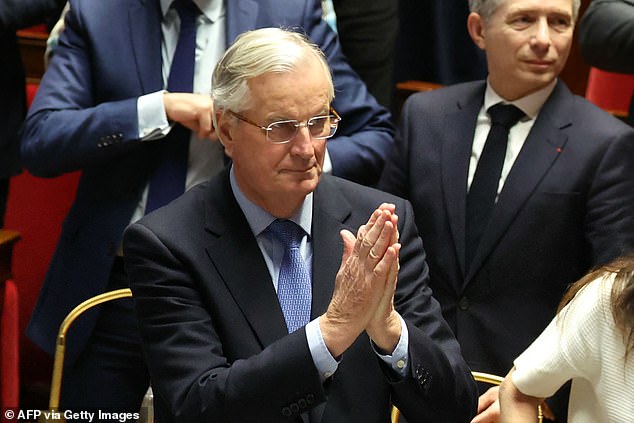France has been left “on the brink” facing an economic crisis and continued political fighting after lawmakers from the far right and left voted yesterday to overthrow Prime Minister Michel Barnier’s government.
The sensational no-confidence vote means Barnier, the former EU Brexit negotiator, will become the shortest-serving prime minister in France’s modern history when he tenders his resignation this week.
He was ousted by lawmakers from Marine Le Pen’s far-right National Rally party and members of France’s leftist coalition, who joined in an unholy alliance to pass a no-confidence motion with 331 of 574 votes, well above the 288 needed. .
The vote prompted French President Emmanuel Macron, who has faced widespread calls to resign amid the chaos, to hold an emergency meeting with his inner circle in which he reportedly lashed out at the left-wing coalition for ousting Barnier.
Macron particularly criticized the Socialist Party (PS) for “inventing an anti-republican front”, criticizing the left as “a coalition of irresponsible people who will have to take responsibility for this before the French people”.
Barnier was ousted after trying to achieve the impossible: crafting a budget to address the mounting national debt while keeping the three squabbling political blocs in the hung French Parliament happy.
Failing to make progress in the National Assembly, Barnier used an article of the French Constitution to force the passage of a social security financing bill as part of a budget that proposed tax increases and spending cuts worth 60 billion euros – a measure that led to the far right and left them to rebel against him.
Both sides spouted rhetoric that Barnier’s proposed budget would hurt and harm the French people, even as the deficit spirals out of control.
His dismissal was summed up by veteran French journalist Eric Brunet, who told BFMTV: ‘What we have just seen is surprisingly French.
‘No pragmatism. Just ideology. All our speech is disconnected from reality. It is typically and uniquely French.
French Prime Minister Michel Barnier gestures following the result of the vote of no confidence in his administration at the National Assembly in Paris on December 4.
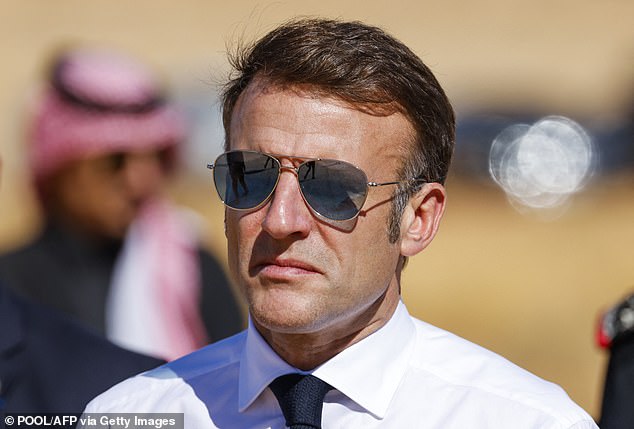
French President Emmanuel Macron was said to be furious at the decision to expel Barnier.

The French media broke down the government’s collapse on their front pages this morning. The headline reads: “Michel Barnier censored: he came, he saw and he was fired.”
Yesterday’s government collapse leaves France in an unenviable position.
The no-confidence vote plunged the nation into a period of political paralysis and many predicted economic disaster would follow.
French bonds and stocks are already selling off at an alarming rate and borrowing costs are soaring, all while public sector workers prepare for mass strikes.
The country’s deficit already exceeds six percent of GDP and is double the limit imposed by the European Union, of which France is a prominent member.
France now risks ending the year without a 2025 budget, although the constitution allows for special measures that would avoid a U.S.-style government shutdown and would see the 2024 budget extended into next year until an alternative is drawn up.
Macron is now under pressure to name a new Prime Minister within days, and US President-elect Donald Trump is expected to visit Paris this weekend for the reopening of the historic Notre Dame cathedral after years of renovations.
Defense Minister loyalist Sebastien Lecornu and Macron’s centrist ally Francois Bayrou are seen as possible contenders.
Macron could well ask Barnier to remain in the interim role while he searches for a replacement.
But any Prime Minister will have his work cut out for him to tame the divided French parliament.
Nicolas Beytout, a political analyst for the French newspaper L’Opinion, predicts that Barnier’s replacement will inevitably face the same obstacles and likely fail just as his predecessor did.
‘A new government needs time, which it will not have. He needs a majority, which he will not have. And he needs the determination to carry out the necessary reduction in state spending, something he will not have.
“So I expect to see several more no-confidence motions, and several more government falls, before we finally begin to wake up,” he concluded grimly.
Former Prime Minister Edouard Philippe added: “Let us be clear: we are on the brink,” warning that the overthrow of the government “reinforces political disorder and weakens our country.”
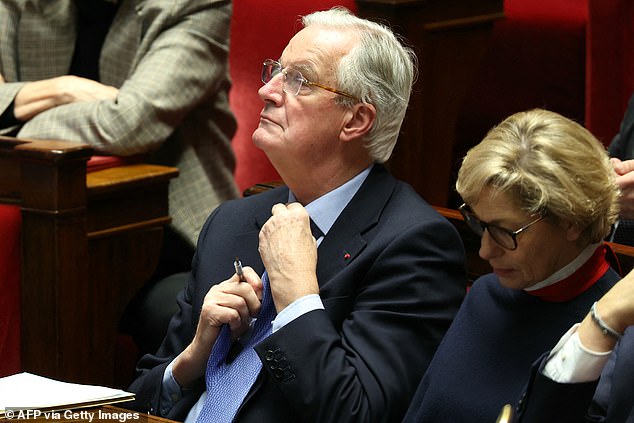
French Prime Minister Michel Barnier attends the debate ahead of the votes of no confidence against his administration at the National Assembly in Paris on December 4, 2024.
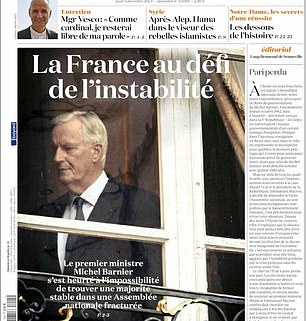
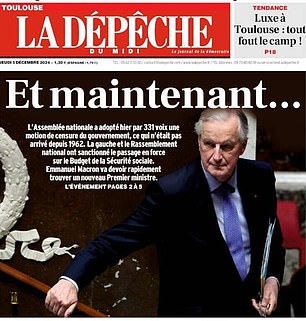
The collapse of Barnier’s government was detailed on the front pages of French newspapers.
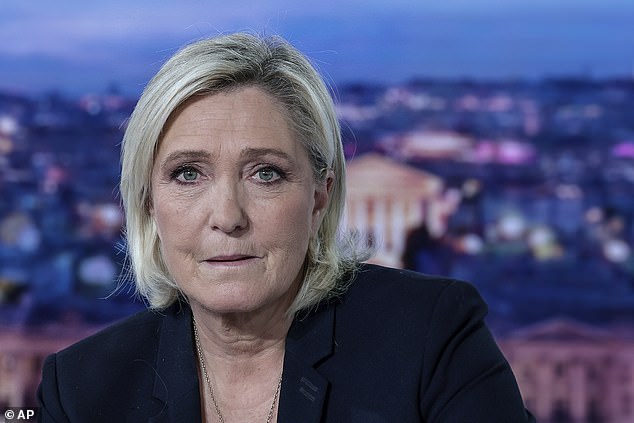
French far-right leader Marine Le Pen poses before an interview on French television channel TF1, in Boulogne-Billancourt, outside Paris, Wednesday, December 4, 2024.
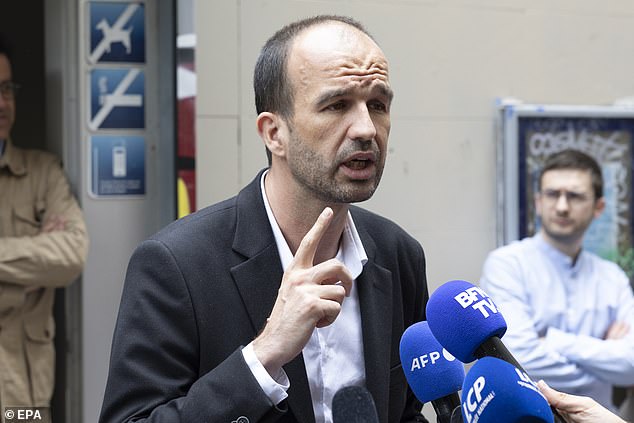
Manuel Bompard speaks to journalists at the LFI Party headquarters in Paris, France
The unfortunate situation has led to massive calls from lawmakers for Macron to resign.
Macron has a mandate until 2027 and cannot be expelled, but the political debacle has left him a diminished figure.
After all, France’s government problems are largely due to the French president’s decision to call early elections over the summer.
French voters duly installed a parliament roughly evenly divided between three blocs: a left-wing coalition, Macron’s centrists and allies, and Marine Le Pen’s far-right National Rally.
The hung Parliament has proven to be largely useless, as each bloc argues and challenges the others without managing to make constructive political decisions.
Normally, this situation would be resolved by going to the polls.
But Article 12 of the French Constitution prohibits “a new dissolution of the National Assembly within one year” of the previous election, meaning Parliament will continue as is at least until July 2024.
Following Barnier’s ouster, several lawmakers declared that the only way forward was for Macron to “reset” the political climate by resigning.
Manuel Bompard, an MP for the leftist France Insoumise (LFI) party, said: “We will see in the next few hours how Emmanuel Macron plans to deal with it… but we are facing an unstable situation.”
“If we want to restore a situation of stability, the departure of the President of the Republic is necessary.”
Bompard also said his party would immediately table another vote of no confidence against Barnier’s replacement if Macron decided to appoint a loyal member of his own party.
‘If the idea is to have a Macronist who lost the European and legislative elections as future Prime Minister, why not censure him?’
“When we vote, there have to be consequences,” he insisted on French broadcaster RTL.
“It would be absurd, after the fall of Barnier’s government, to name a member of the political force that came in third place.”
Another LFI member, Éric Coquerel, said: “This government has never had legitimacy and the responsibility lies more with Mr Macron than with Mr Barnier.”

The President of France, Emmanuel Macron, and the Prime Minister of France, Michel Barnier.

French President Emmanuel Macron arrives in Al Ula, Saudi Arabia, on December 4, 2024

French President Emmanuel Macron arrives in Al Ula, Saudi Arabia, on December 4, 2024
Macron, who yesterday returned to face the political consequences in France after a state visit of several days to Saudi Arabia, has defiantly announced that he will not leave office until his term ends in 2027.
“It happens that if I am here before you it is because I was elected twice by the French people,” Macron declared while in Riyadh, describing calls for his resignation as “political fiction.”
Curiously, the far right has not openly called on Macron to resign despite its matriarch Le Pen’s obvious disdain for the president.
The president of the National Group, Jordan Bardella, said yesterday that he was “respectful of the institutions” and added that “there is no justification at this time for the President of the Republic to leave.”
But some observers have suggested that Le Pen, 56, is seeking to unseat Macron before his term ends by toppling Barnier in a broader political ploy.
Le Pen, who is expected to run for the presidency in 2027, is also involved in a high-profile embezzlement trial.
If she is found guilty in March, she could be barred from participating in France’s next presidential election.
She has insisted, however, that her party’s decision to vote in favor of a motion of no confidence against Barnier was due entirely to his budget proposal which she claims would impoverish the French.
Following the “catastrophic continuity of Emmanuel Macron”, the prime minister “could only fail”, he wrote on social media.


